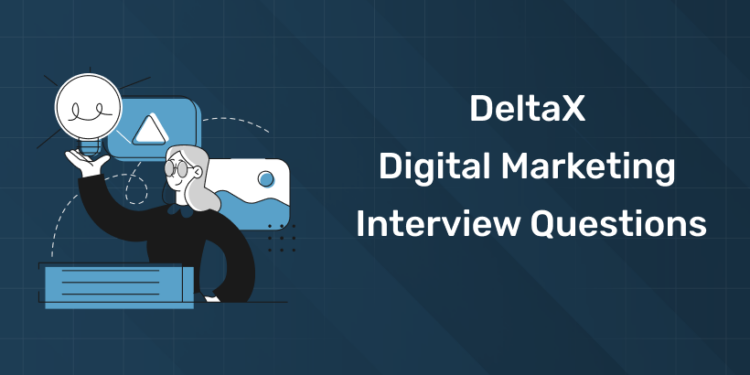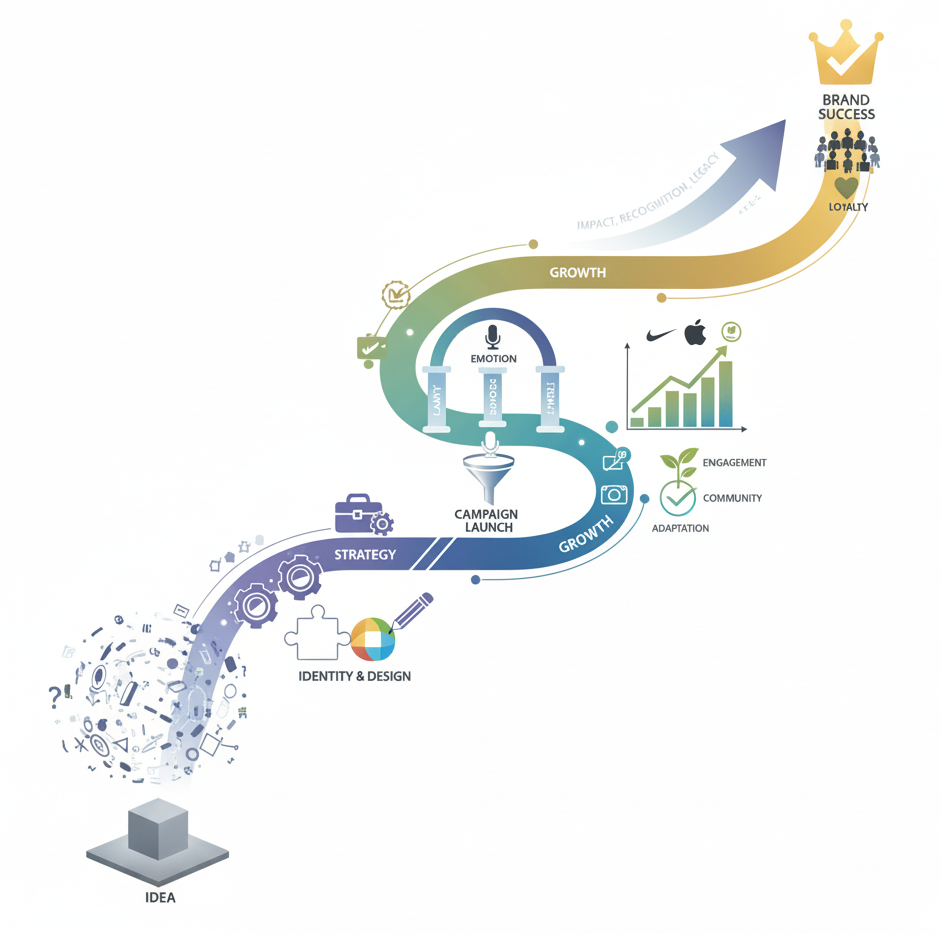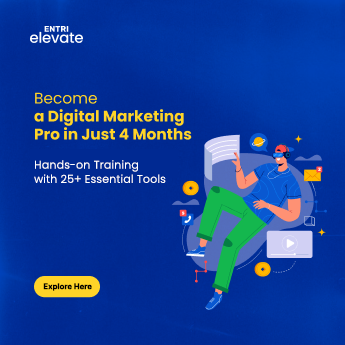Table of Contents
Digital marketing interviews at DeltaX are known for their rigor. Candidates are evaluated on various aspects of digital marketing expertise. Emphasis is placed on knowledge of SEO, SEM, and content strategy. Analytical skills and data interpretation are also thoroughly assessed. Candidates must demonstrate proficiency in digital marketing tools and platforms. We will have a look at Deltax Digital Marketing Interview Questions in this blog.
Questions related to campaign management and performance metrics are common. Practical knowledge of social media marketing is frequently tested. Scenario-based questions are used to assess problem-solving abilities. Understanding of industry trends is highly valued during interviews. Thorough preparation and up-to-date knowledge are essential for success.
DeltaX Digital Marketing Interview Questions
Introduction
DeltaX was founded in 2012 by Abhinav Jain in Bangalore. It has since grown into a leading digital marketing platform. Branches have been established in major cities across the globe.
Innovative technology is continuously developed to optimize marketing campaigns. Advanced algorithms are employed to deliver data-driven marketing solutions. The platform is trusted by top brands for personalized strategies.
Global reach and local expertise have been key to DeltaX’s success. Impactful results are consistently achieved for clients worldwide. The company remains focused on driving growth and innovation in digital marketing.
Learn Digital Marketing Fundamentals! Get a Free Demo Here!
Why Join in DeltaX as Digital Marketer
Who is a Digital Marketer?
- Definition: A digital marketer promotes products or services using digital channels.
- Skills: Requires knowledge of SEO, content marketing, social media, and analytics.
Key Roles of a Digital Marketer
Strategy Development
-
- “Plan and implement digital marketing strategies.”
- “Align strategies with business goals.”
Content Creation
-
- “Develop engaging content for websites and social media.”
- “Create blogs, videos, and infographics.”
SEO Management
-
- “Optimize website content to improve search engine rankings.”
- “Conduct keyword research and on-page SEO.”
Social Media Management
-
- “Manage social media accounts and campaigns.”
- “Engage with followers and track social media performance.”
Email Marketing
-
- “Design and send email campaigns to subscribers.”
- “Segment email lists and analyze campaign results.”
PPC Advertising
-
- “Create and manage pay-per-click ad campaigns.”
- “Optimize ad spend and track ROI.”
Analytics and Reporting
-
- “Monitor and analyze digital marketing performance.”
- “Generate reports and adjust strategies based on data.”
Market Research
-
- “Conduct research to understand market trends and customer needs.”
- “Analyze competitors and target audiences.”
Website Management
-
- “Update and maintain the company website.”
- “Ensure a good user experience and fast load times.”
Campaign Management
-
- “Plan and execute marketing campaigns across channels.”
- “Track campaign effectiveness and make adjustments as needed.”
Scope of a Digital Marketer
Digital marketing is used across many industries and businesses of all sizes. It covers various channels like SEO, social media, email, and PPC. Each channel helps attract and engage different audiences.
Digital marketers plan strategies and run campaigns, adjusting based on performance. They use tools for automation, data analysis, and CRM to improve efficiency.
Marketing has a global reach, allowing for targeted strategies in different regions. The field is always changing, so marketers stay updated with trends and technologies. They work with various teams and use metrics to measure success, combining creativity and data to create engaging customer experiences.
DeltaX Digital Marketing Interview Tips
1. Research the Company
- Know DeltaX: Learn what DeltaX does and its services.
- Understand the Market: Know who DeltaX’s customers are.
- Review Recent Work: Look at recent DeltaX campaigns and results.
- Check Company Values: Understand DeltaX’s mission and values.
2. Prepare for Common Questions
- Marketing Basics: Be ready to discuss SEO, SEM, and social media.
- Data Skills: Be prepared to talk about using data for decisions.
- Scenario Questions: Practice solving marketing problems and case studies.
- Experience Examples: Share specific examples of past work.
3. Showcase Your Skills
- Relevant Projects: Highlight relevant projects or campaigns you’ve worked on.
- Success Stories: Share success stories and results from past work.
- Problem-Solving: Explain how you tackle marketing challenges.
- Tool Proficiency: Show your experience with marketing tools and software.
4. Demonstrate Industry Knowledge
- Current Trends: Be aware of the latest trends in digital marketing.
- Competitor Insights: Know DeltaX’s competitors and their strategies.
- Innovations: Discuss recent innovations and their impact on marketing.
- Future Trends: Talk about future trends you’re excited about.
5. Ask Insightful Questions
- Work Environment: Ask about DeltaX’s work culture and team dynamics.
- Career Path: Inquire about career growth and learning opportunities.
- Upcoming Projects: Ask about upcoming projects and goals.
- Team Structure: Understand how the marketing team is organized.
6. Practice Communication Skills
- Clear Answers: Make sure your answers are clear and straightforward.
- Confidence: Speak confidently about your skills and experiences.
- Active Listening: Listen carefully and respond to interview questions.
- Body Language: Use positive body language and maintain eye contact.
Learn Digital Marketing Fundamentals! Get a Free Demo Here!
Top DeltaX Digital Marketing Interview Questions and Answers
1: What is the primary goal of SEO (Search Engine Optimization)?
1. How have you optimized a marketing campaign using data analytics?
- Used Google Analytics to track traffic sources & user behavior.
- Identified high-performing ad creatives & optimized them for better CTR.
- Analyzed audience insights to refine targeting & reduce CPA.
- Implemented A/B testing to improve landing page performance.
2. What are some common digital marketing challenges & how do you overcome them?
- Low conversion rates → Improved landing pages & CTAs.
- Ad fatigue → Rotated creatives & tested new formats.
- Budget limitations → Focused on high-ROI channels like SEO & email.
- Platform algorithm changes → Adapted strategies by staying updated with industry trends.
3. How do you prioritize tasks when managing multiple campaigns?
- Defined clear KPIs & campaign objectives.
- Used a content calendar & task management tools (Trello, Asana).
- Focused on high-impact activities first (ad optimization, retargeting).
- Regularly monitored performance metrics to adjust strategies.
4. How do you leverage email marketing to drive engagement?
- Created personalized email sequences for lead nurturing.
- Used A/B testing on subject lines & CTAs.
- Automated drip campaigns with HubSpot & Mailchimp.
- Tracked open rates & optimized email timing.
5. What strategies do you use to handle negative feedback on digital platforms?
- Respond promptly & professionally to maintain brand trust.
- Address concerns with transparency & empathy.
- Use social listening tools to monitor sentiment trends.
- Turn negative feedback into an opportunity for brand improvement.
6. Why do you want to work at DeltaX?
- Passionate about data-driven marketing & automation.
- Interested in working with AI-powered marketing solutions.
- Excited to learn from industry leaders in digital advertising.
- Want to contribute to high-impact marketing campaigns.
Technical Digital Marketing Questions
7. What is affiliate marketing & how does it work?
- A performance-based strategy where affiliates earn a commission per sale.
- Uses custom tracking links for attribution.
- Commonly used in influencer marketing, blogging & e-commerce.
8. How do you conduct market research for a campaign?
- Competitor analysis using tools like SEMrush & Ahrefs.
- Audience insights from Google Analytics & Facebook Insights.
- Surveys & social media polls for customer preferences.
- Used heatmaps & session recordings for UX analysis.
9. What are backlinks & why are they important?
- Backlinks are external links pointing to your website.
- Help improve search rankings & domain authority.
- Earned through guest blogging, PR & content collaborations.
10. How do you create an effective content calendar?
- Define content goals (brand awareness, engagement, conversions).
- Plan content types (blogs, social media, videos, email).
- Use tools like Trello, Notion & Buffer for scheduling.
- Optimize content based on seasonal trends & analytics.
Become an AI-powered Digital Marketing Expert
Master AI-Driven Digital Marketing: Learn Core Skills and Tools to Lead the Industry!
Explore CourseStop Guessing. Start Building. Download the Proven Brand-Building Playbook
SEO & Paid Ads Questions
11. What is Google Analytics & how do you use it?
- A tool to track website traffic & user behavior.
- Measures metrics like bounce rate, session duration & conversions.
- Helps optimize marketing strategies based on data insights.
12. How do you stay updated with digital marketing trends?
- Follow industry blogs & influencers (Neil Patel, HubSpot, SEMrush).
- Attend webinars & marketing conferences.
- Experiment with new ad formats & SEO techniques.
13. Can you give an example of a successful social media campaign?
- Launched a viral Instagram contest for engagement.
- Partnered with micro-influencers to expand reach.
- Increased brand awareness by 40% in three weeks.
- Drove direct sales using Facebook retargeting ads.
14. How do you measure the success of a campaign?
- Track CTR, CPA, ROI & conversion rates.
- Use UTM tracking, Google Analytics & Meta Ads Manager.
- Adjust strategy based on real-time performance reports.
15. What is your experience with SEO?
- Conducted keyword research, on-page SEO & backlink building.
- Optimized website speed & technical SEO issues.
- Increased organic traffic by 60% in six months.
Ad Management & Budgeting
16. How do you manage a digital marketing budget?
- Allocate budgets based on high-performing channels.
- Use Google Ads Budget Planner for cost management.
- Monitor daily spending & adjust for ROI optimization.
17. How do you handle rapid changes in digital marketing?
- Adapt quickly to Google & social media algorithm updates.
- Test & experiment with new ad formats & content strategies.
- Follow industry case studies & competitor strategies.
18. How do you ensure collaboration in a marketing team?
- Use tools like Slack, Notion & ClickUp for communication.
- Set clear KPIs, responsibilities & deadlines.
- Conduct weekly stand-up meetings for updates.
19. Why is storytelling important in digital marketing?
- Creates emotional connections with the audience.
- Increases brand recall & engagement.
- Works effectively in video marketing & social media.
20. How do you implement A/B testing in marketing?
- Test headlines, CTAs, ad creatives & landing pages.
- Use tools like Google Optimize & Facebook Experiments.
- Scale winning variations for better conversions.
DeltaX Digital Marketing Aptitude Questions
1. Percentage & ROI Calculation
A company spends ₹50,000 on a Facebook Ads campaign. The total revenue generated from the campaign is ₹1,50,000. What is the Return on Investment (ROI)?
A. 100%
B. 150%
C. 200%
D. 300%
Answer:
ROI = [(Revenue – Cost) / Cost] × 100
= [(1,50,000 – 50,000) / 50,000] × 100
= (1,00,000 / 50,000) × 100
= 200% (Option C)
2. Logical Reasoning – Pattern Identification
A digital marketing agency observes a pattern in website traffic:
- Monday: 500 visits
- Tuesday: 700 visits
- Wednesday: 1000 visits
- Thursday: 1400 visits
- Friday: ?
What is the expected number of visits on Friday if the trend continues?
A. 1600
B. 1800
C. 2000
D. 2400
Answer:
The pattern follows a +200, +300, +400 sequence. So, the next increment should be +500.
1400 + 500 = 1900
(None of the options exactly match, but closest would be 2000 if rounding up.)
3. Data Interpretation – Ad Performance
An e-commerce business runs a Google Ads campaign with the following data:
| Campaign | Clicks | Impressions | CTR (%) | Conversions |
|---|---|---|---|---|
| A | 1000 | 50,000 | 2% | 50 |
| B | 800 | 40,000 | 2% | 40 |
| C | 1200 | 60,000 | 2% | 60 |
Which campaign has the highest conversion rate?
A. Campaign A
B. Campaign B
C. Campaign C
D. All are equal
Answer:
Conversion Rate = (Conversions / Clicks) × 100
- Campaign A: (50 / 1000) × 100 = 5%
- Campaign B: (40 / 800) × 100 = 5%
- Campaign C: (60 / 1200) × 100 = 5%
All campaigns have the same conversion rate (Option D).
4. Problem Solving – Cost Per Click (CPC) Calculation
A company spends ₹20,000 on Google Ads and gets 400 clicks. What is the Cost Per Click (CPC)?
A. ₹50
B. ₹40
C. ₹20
D. ₹25
Answer:
CPC = Total Spend / Total Clicks
= ₹20,000 / 400
= ₹50 (Option A)
5. Logical Reasoning – Marketing Funnel
If 10,000 users visit a website, 8% of them sign up for a free trial, and 30% of those who sign up purchase the paid plan, how many customers purchase the plan?
A. 800
B. 240
C. 300
D. 400
Answer:
Free trial sign-ups = 10,000 × (8/100) = 800
Paid plan customers = 800 × (30/100) = 240 (Option B)
6. Verbal Aptitude – Identifying Errors
Which sentence is grammatically correct for an ad copy?
A. “Get best digital marketing strategies that work for your business!”
B. “Get the best digital marketing strategies that work for your business!”
C. “Best digital marketing strategy that work for your business!”
D. “Get a best digital marketing strategies that works for your business!”
Answer:
Correct sentence: Option B – “Get the best digital marketing strategies that work for your business!”
7. Analytical Thinking – Social Media Metrics
A digital campaign had 1,00,000 impressions and 5,000 engagements. What is the engagement rate?
A. 2%
B. 5%
C. 10%
D. 50%
Answer:
Engagement Rate = (Engagements / Impressions) × 100
= (5,000 / 1,00,000) × 100
= 5% (Option B)
8. Logical Reasoning – Customer Segmentation
Which of the following best represents customer segmentation in digital marketing?
A. Dividing users based on their favorite colors.
B. Grouping users based on purchasing behavior.
C. Categorizing people randomly for targeting.
D. Sending the same ad to all users, regardless of behavior.
Answer:
The correct approach to segmentation is Option B – Grouping users based on purchasing behavior.
9. Conversion Rate Optimization (CRO) Question
A company increased the size of the “Buy Now” button on its website and saw a 15% increase in purchases. This is an example of:
A. A/B Testing
B. SEO Optimization
C. Influencer Marketing
D. Affiliate Marketing
Answer:
Testing different versions of a page element to see what performs better is A/B Testing (Option A).
10. Time & Work – Campaign Management
A marketing team can optimize 4 ad campaigns per day. If there are 20 campaigns, then how many days will it take for the team to complete optimization?
A. 4
B. 5
C. 6
D. 8
Answer:
Total campaigns = 20
Daily optimization capacity = 4
Days required = 20 / 4 = 5 days (Option B).
Learn Digital Marketing Fundamentals! Get a Free Demo Here!
DeltaX Digital Marketing Interview Questions: Conclusion
To excel in interviews like those at DeltaX, having a strong foundation in digital marketing is crucial. Enroll in our Digital Marketing Training Course with Placement, designed to equip you with industry-leading strategies, hands-on experience with top tools, and insights into key performance metrics. Our course goes beyond theory, offering real-world case studies and practical applications to prepare you for success. With expert guidance and certification, you’ll gain the confidence to ace interviews and build a thriving career in the dynamic field of digital marketing.
Frequently Asked Questions
What should I expect in a DeltaX digital marketing interview?
- “Expect questions on strategy, tools, and campaign management.”
- “Be prepared to discuss your experience and specific examples.”
How can I prepare for DeltaX digital marketing interview questions?
- “Research DeltaX’s marketing strategies and recent campaigns.”
- “Review common digital marketing concepts and tools used.”
What types of questions are asked in DeltaX digital marketing interviews?
- “Questions cover SEO, PPC, social media, and content marketing.”
- “Be ready for scenario-based questions and practical examples.”
How important is knowledge of analytics in the interview?
- “Understanding analytics is crucial for measuring campaign performance.”
- “Be prepared to discuss how you use data to make decisions.”
How can I showcase my experience effectively in the interview?
- “Provide specific examples of successful campaigns you managed.”
- “Highlight results and metrics to demonstrate your impact.”
What are some common mistakes to avoid in the interview?
- “Avoid vague answers; be specific about your contributions.”
- “Do not overlook the importance of explaining your decision-making process.”














